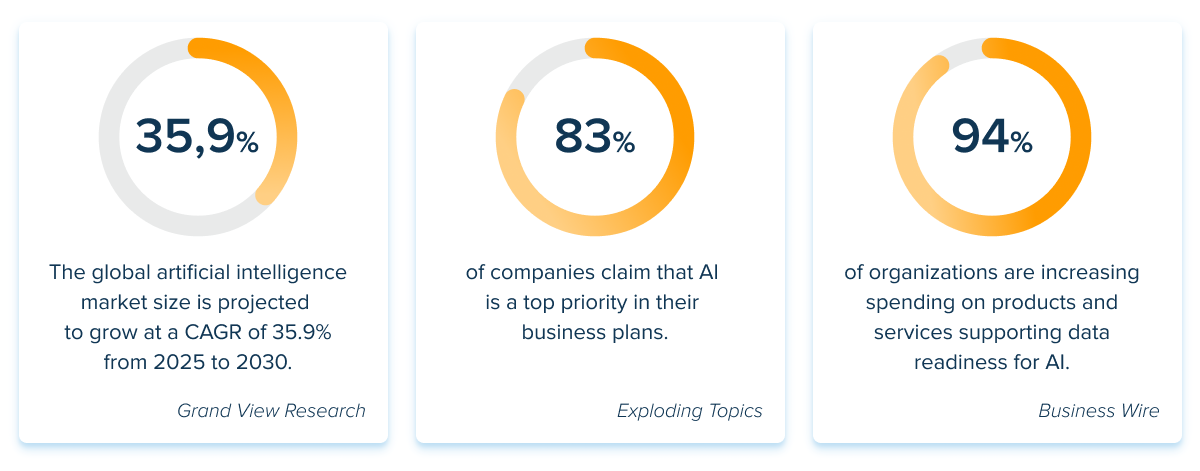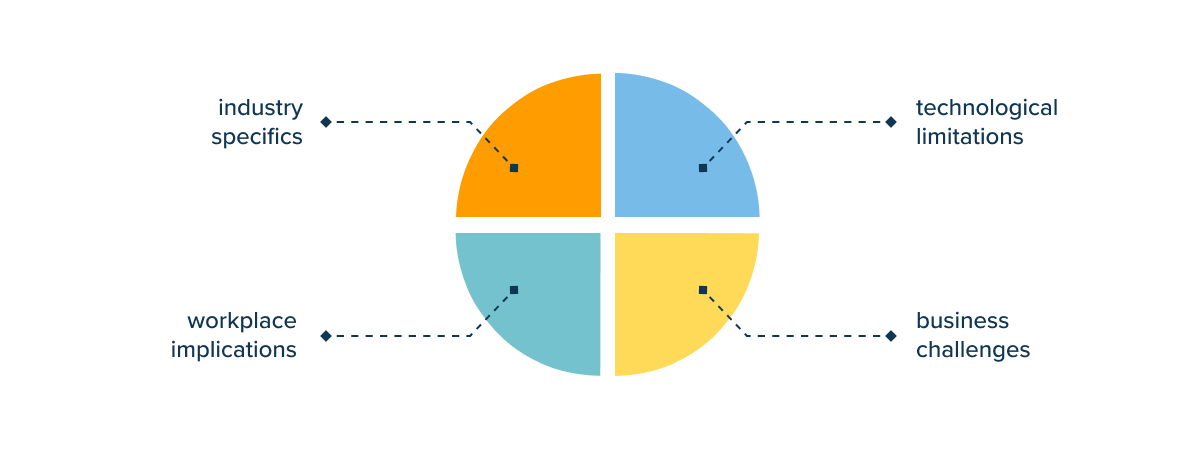Today, business adoption of AI strategy consulting has reached an all-time high. According to PwC, nearly half of tech leaders (49%) say AI is now fully integrated into business strategy. And it’s only the beginning.
Deloitte claims that 25% of enterprises will deploy AI agents this year. However, deploying something as challenging as smart algorithms inherently stands for artificial intelligence implications for business strategy.

The numbers above look discouraging for tech-driven companies. And that is the main reason why artificial intelligence consulting has become an industry standard since it allows companies to smoothly transition to automated business processes. Different types of consulting firms can also ensure maximum AI potential for specific business needs and minimize the chance of failure.
What is an artificial intelligence strategy?
An artificial intelligence strategy is a plan for how to integrate AI into your business to achieve specific goals. These goals might include increased efficiency, lower costs, improved customer engagement, or even increased sales.
To create an effective AI strategy, you’ll need to understand both the opportunities and challenges that AI presents for your business. You’ll also need to know what type of custom AI software development (if all) is right for your needs and how to implement it.
What does your smart strategy include?
There is no one-size-fits-all answer, as the approach you take to AI will be heavily influenced by your specific business needs and goals. However, there are a few key considerations that any AI business strategy should include. Let’s go over the main components.
Strategic use cases
Each implementation plan targets a specific application area. Therefore, companies should first identify and prioritize one or a set of necessary use cases for smart transformation. However, this already hides challenges since each potential area should be considered according to specific metrics such as ROI.

Source: Unsplash
Infrastructure
Network requirements are another component of an AI industrial strategy. In particular, adoption requires a large number of high-performance computing resources, such as CPUs and GPUs. Storage capacity, security as well as fast and reliable networks are also important prerequisites for automation.
At-scale adoption further raises the bar for the tech ecosystem. Thus, innovative facilities and high-density compute infrastructure are the next step in prepping your in-house computing power.
Data
Moreover, any intelligent system relies on complete and accurate data. If your data is scattered or siloed across different business resources or stored on-site, it is compulsory to get to grips with it. In any case, the business case will define the type of data and the importance of external databases. To prevent further AI issues, you should also pay due diligence to data security and compliance.
And this is hardly an exhaustive list of all pre-planning to be made to blend AI and business strategy into a solid whole. In this case, companies can either grope for the most effective adoption strategy or hand over the end-to-end implementation to machine learning or AI consulting.
What is artificial intelligence consulting?
This type of consulting is a rapidly growing field that involves the use of artificial intelligence to solve business problems. Experts help organizations find and implement the right smart solutions to optimize their operations and increase efficiency. Thus, businesses can harness the power of Big data and next-gen tech to make better decisions, improve customer engagement, or boost their AI marketing analytics.
On a higher level, all these issues can be divided into four groups:

With that said, consultants can handle the above-mentioned problems by forging bespoke artificial intelligence strategies for leading business transformation.
Two flavors of intelligence consulting
In a broad sense, consulting involves providing expert advice and/or implementation support for businesses that are looking to leverage automation. However, consulting services vary greatly based on the maturity of adoption. Let’s have a look at the most popular offerings in the field.
Executive strategy consulting
Executive consulting is the process of providing strategic and tactical advice to executives within organizations. It encompasses a broad range of activities, from human resources to operations management, and typically aims to improve or benchmark organizational performance when adopting automation.
Consultants may be brought in from the outside or may be promoted from within an organization. They typically have a lot of experience in the industry or sector they are advising on, as well as experience working with executives. This kind of coaching also involves initiative planning, metrics, and build-or-buy decisions. Executive advisors can be engaged in shortlisting vendors for further solution development.
Defining a solid business goal and assessing the business relevance of a smart solution also goes into this type of consulting. To learn more about AI consulting and strategy implementation, please watch a video:
Technical strategy consulting
This type of consulting is tied to prompting the technical readiness of a given company. Technical expert advice may encompass a wide range of services, including end-to-end guidance from start to an operating intelligent solution. For legacy-driven companies, consultants can recommend a hassle-free smart transition or improvement of legacy systems.
Since technological maturity is also a cornerstone for artificial intelligence structures and strategies for complex problem solving, this type of consulting is a popular option for both budding and seasoned companies.

Source: Unsplash
As a rule, those types of advice do not come as a standalone consultation unless it is demanded so. Since business and technology should merge to form synergy, companies should factor in both business and tech-driven factors. Therefore, experts help to form an AI strategy based on the two pillars.
How do artificial intelligence strategy experts help enterprises?
According to multiple resources, the volume of generated data will reach a point where data-driven businesses will thrive, while those in the unknown won’t be able to make the most of the information field.
Data surge also makes artificial intelligence the lifeblood of modern businesses with an artificial intelligence strategy carving a way for successful adoption. Now let’s see why companies turn to professionals to shape their roadmap.
Crafting the right strategy
First and foremost, top strategy consulting in AI is aimed at contextualizing your automation needs and goals. Before going full gear with your smart initiatives, experts will:

Moreover, external counselors often assist companies in identifying talent gaps and selecting a suitable team based on the objectives. Bridging your internal capability gap means identifying what you need to acquire and any processes you need to internally develop before you get started.
Automation consulting doesn’t boil to tech-driven problems such as conversational AI strategy. Experts can also guide teams in mapping an AI marketing strategy, AI product strategy, AI testing strategy, and even provide customer experience consulting for user-facing projects.
In any case, the result of this activity is a detailed roadmap which is a document that describes the steps you plan to take to meet your automation vision over time. Roadmap usually includes milestones, core technologies, as well as products and solutions needed to make your business more data-driven.
Data audit
Once the objective and the solution strategy have been identified, teams can go over to data. A data audit is also a popular consulting offering since this stage presents challenges for companies. What and how much data is needed for successful projects? It depends and that’s when you need professional advice. Some algorithms can get away with lesser accurate rates when others need to score around 97% at the output.
Experts will typically assess your business data to see if it meets quality and availability requirements. In case your datasets are siloed or need enriching, consultants will chart out the steps needed to obtain comprehensive input. In most cases, they can also take care of reorganizing and cleaning data on their own.

Source: Unsplash
AI model training
Artificial intelligence strategies for leading business transformation also include model training. In particular, experts help teams gather all the requirements to build the smart model. Once your data is up to sniff, your team can get down to picking a training data set, i.e. data annotation. Labeled data provides the relevant inputs to train the algorithms in the context of certain patterns.
Then, as a part of your strategy, you should select model features. The latter should be the same for training and testing the model. Once you and the team define the features, the next step is to choose the most suitable algorithm. Here, experts can also advise on the most relevant and interoperable algorithms for easier decision-making.
Since a high-performing machine learning model is time-consuming to develop, it’s not always the best option. Consultants also help businesses to decide between ready-made models and bespoke ones, taking into account their effectiveness and business dynamics.
Implementation and deployment
At the deployment stage, machine learning consulting helps shape models into full-blown solutions. They also chart out the deployment strategy to integrate smart software into enterprise systems. In most cases, consultants help set up an iterative model deployment to better identify the changing patterns in data and processes.
Moreover, professional guidance is valuable for choosing the right production requirements and navigating organizational structure. The right tooling and infrastructure for model deployment is also a common underwater rock. Whether it is computing requirements or storage infrastructure, the whole setup should be calibrated to the specific model.

Source: Unsplash
At this stage, the large-scale AI infrastructure is constructed. Overall, this phase must include continual evaluation and redevelopment based on the model’s behavior throughout time. Therefore, online and offline metrics are set to evaluate the model’s performance or accuracy.
Tech specialists will assist companies in building a pilot system to demonstrate the capability of AI technology and analyze the possible improvement to the full-scale solution. Proof of concept and mockups are also vital to collect feedback from the stakeholders and prepare a roadmap for your project.
User training and support
Once the model is successfully deployed, it is time to train your internal teams. Continuous support is also important to eliminate bottlenecks at the initial stages. Along with relevant technical competency, your internal staff should be well-versed in AI security tools to ensure the safeness of data.
Machine learning models are dynamic and decay over time after being released. Therefore, post-production maintenance and model retraining regimen is as important as planning and deployment. Professional expertise will enable businesses to map out a retraining strategy to avoid model drift.
As for maintenance, companies need to select the right monitoring metrics to assess model performance. To prevent model drifts, models should be regularly renewed with the latest data on a time-based or continuous basis. A good grasp of how frequently data and variables change in your model’s environment is necessary for time-based retraining. For continuous updates, companies need to take heed of accuracy thresholds and bias metrics to identify the right time of updates.
Setting up the team
Establishing a center of excellence also includes assembling the right team of pros. Whether an AI team is an extension of existing units or a whole new structure, it should take over the current AI-related tasks. Professional consulting agencies will help fresh-baked units to construct a robust technical infrastructure needed for transformation. Moreover, a steadfast vision and external innovations are equally vital for any artificial intelligence unit.
However, if companies are not looking for on-site teams, consulting companies can also provide their ready-made units. Outsourced specialists usually include top ML developers with additional talent like business analysts and project managers.

Source: Unsplash
Governance of artificial intelligence
Last but not least, governing smart solutions is a cornerstone for maximum solution transparency across organizations. As such, it refers to defining policies and assigning accountability during solution development.

According to IBM, on-site regulation of smart transformation includes:
- an organizational setup that provides governance leaders with the relevant insight to flesh out policies and establish accountability for the organization
- an improved AI lifecycle that gathers this information, enforces the policies and makes these insights digestible for interested parties.
As there are no specific recommended measures for both, each organization should come up with a tailored governance strategy. The latter will include measures or metrics for AI governance to bolster their strategic direction. Some of the KPIs here typically include cost-value ratio, clarity of responsibilities as well as measures of time and bias.
The safety of consumer data is also classified as a governance issue. Since there are no widely used policies, privacy and the responsible use of consumer information is an important component of regulation across companies. GDPR in the EU and the California Privacy Act in the US are among the few examples that guard data in the healthcare and California-located services.
On this note, expert advice will come in handy to factor in the unique governance and risk implications as well as contextualize governance frameworks and principles.
Summing up, IT consultancies offer a wide array of AI-specific services from strategy design to AI marketing analytics. As a rule, companies resort to guidance for end-to-end project support, thus handing over the whole process to a trusted and knowledgeable partner. However, not all companies provide the best IT consulting.
How much does an AI consultant cost?
Machine learning consulting rates depend on a lot of factors. Custom AI applications, for instance, may cost somewhere from $15 K up to $70-100K and more. This price cleft is justified by the differences in the pricing models, project scope, and other criteria.
Typically, your solution will be charged based on:
- exclusiveness – whether your smart solution is built from scratch or reuses pre-built parts;
- engagement model – flat rate or hourly rate;
- project scope – larger, more complicated projects with miscellaneous data and high accuracy scores equal a higher price tag;
- requirements – Big data characteristics such as data quality, volume, and others;
- solution architecture – a complex solution setup translates into more hours from a consultant.
Moreover, exact estimation also depends on your consultant’s location, company’s maturity, project functionality, and a specific type of AI solution.
Choosing top strategy consulting in AI
There are over 3,000 artificial intelligence partners on Clutch alone. From startups to vibrant data science houses, companies often get lost in landing the right transformation assistant. That is why we’ve curated a list of benchmarks to consider when seeking top strategy consulting in AI.
Niche-specific experience
Expertise and domain competence are the usual suspects when it comes to the selection criteria. A proven track record allows a business intelligence company to foresee potential problems and address them before they become an issue. This reduces the chances of delays or misunderstandings between the client and the development team.

Source: Unsplash
However, broad artificial intelligence expertise isn’t always the best fit, since your business case may require a narrow knowledge field like object detection or OCR solutions. Therefore, make sure you understand your business needs. Otherwise, request professional help to narrow down your search.
Custom solutions
While off-the-shelf AI solutions boast a large selection of features and an easy setup process, they often come with limitations that constrain their ability to adapt to specific business needs. In contrast, custom AI solutions are designed specifically for a single organization, making them better equipped to address the organization’s unique challenges and requirements.
Therefore, your ideal partner shouldn’t settle down for a ‘one-size-fits-all’ solution unless it is justified. Pre-built artificial intelligence models are possible provided they are fine-tuned to meet your business goals.
Transparent cases
Multiple years of experience should be backed by a solid portfolio. The latter should be easily accessible via a company’s website or on demand. Although some projects cannot be posted due to the NDA limitations, you should still have an opportunity to look into specific cases, numbers, and ROIs.
Choose a seasoned artificial intelligence company with real references and insights into success stories they’ve built. Make sure to find out about the main project challenge, used technologies and tools as well as the project pipeline. Ideally, you should focus on similar projects or at least browse projects in the same industry. Customer testimonials may further serve as a point of contact for you.
Research and development centers
Leading software companies also invest in R&D centers to lead the innovation and partake in building ground-breaking solutions. By performing R&D activities, vendors can identify new methods and approaches to improve their flagship products and services with AI technology. Contribution to scientific communities and the global research arena proves the company’s ability to stay at the edge and perfect internal competency.

Source: Unsplash
Moreover, AI-specific event exposure is another positive indicator of a vendor’s experience. Hackathons, summits, and conferences attest to the company’s global stand and allow clients to have a deeper look at the vendor’s achievements. Flagship smart solutions also contribute to a positive brand image and add bonus points when selecting the right partner.
The bottom line
Amidst the massive tech transformation, it is important, however, to pay due diligence before going full gear with intelligent systems. Strategic planning is a mandated step to ensure optimal business-tech match and deliver value for years to come.
The right team of AI experts can bring in a multi-disciplinary roadmap that polishes your company’s vision and establishes AI imperatives. Also, professional guidance is your shortcut to reliable smart infrastructure, accurate and unbiased data along continuous model learning.
FAQ
-
According to multiple resources, AI consultant’ rates typically range from $100 to $500 per hour, depending on their experience and project complexity. Fixed-price projects can start at $5,000 and go up to $100,000+ for enterprise-level solutions.
-
AI strategy consulting helps businesses identify how artificial intelligence can drive value, improve operations, and support long-term goals. Consultants assess current capabilities, define use cases, and create a roadmap for adopting AI technologies in a scalable and cost-effective way.
-
At InData Labs, our experienced AI consultants work closely with you to develop a tailored AI strategy. We start by gathering detailed requirements and understanding your business goals, challenges, and data landscape.
Then, we analyze your current capabilities and identify high-impact AI use cases. Based on these insights, we create a customized roadmap that aligns AI adoption with your business needs, ensuring measurable value and sustainable growth.
-
An AI strategist is a professional who helps organizations plan and implement artificial intelligence initiatives that align with their business goals. They identify opportunities for AI adoption, assess data readiness, define use cases, and develop a clear roadmap for AI integration. AI strategists bridge the gap between technical teams and business leaders to ensure AI solutions deliver real, measurable value.
-
AI can support consultants by automating data analysis, generating insights, and streamlining routine tasks, but it cannot fully replace them. Human consultants bring critical thinking, industry expertise, creativity, and emotional intelligence to complex business challenges.
At InData Labs, we believe AI enhances the consulting process, helping experts deliver faster, deeper, and more strategic value—not replacing them, but empowering them.



